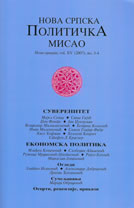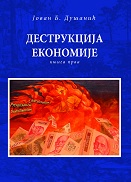| NSPM in English | |||
Kosovo and the rise of Serbia’s “euroscepticism” |
 |
 |
 |
| четвртак, 14. август 2008. | |
|
After the fall of Slobodan Milosevic in October 2000, membership of the EU appeared to the majority of Serbian public opinion as a goal without an alternative. This was not due to the billions promised to Serbs by some European politicians in the case of the downfall of Milosevic. No, Serbia did not opt for Europe because of money. It did so because it saw Europe as its natural surroundings, and almost all of us from the Serb intelligentsia were convinced by the Westerners. It seemed to us that, with the fall of Milosevic, the disagreements between Serbia and the West were forever resolved. It seemed to us that a thousand-year golden era of peace and prosperity was ahead of us. A democratic Serbia would stand shoulder to shoulder with its Western friends and we would be united in marching towards a brighter future. It did not turn out that way. Although Serbia extradited to the Hague two of its presidents, a prime minister, a vice-prime minister, a bunch of ministers and the entire wartime chief of staff, she was still accused of “not cooperating enough with the Tribunal” and that as a result, cannot even enter the antechamber of the European Union. Although Serbia had recovered and strengthened democracy, as well as offered Kosovo all the self-rule imaginable, she was still being told that she had “lost the moral right to rule Kosovo” and that “there was no return of Kosovo to Serbia”. We began to understand that there was something wrong with our friendship. It was clear that we had understood our friendship in a different way. Serbia is sentimental. But Serbia is not stupid. Those who defined talks between Belgrade and Pristina in a way in which Belgrade could not obtain anything, and Pristina must obtain everything – maybe are not our great friends? The problem was that the conditions for Serbia’s integrations kept on increasing. They were never alike those for other candidate countries. After the EU summit in December 2007, UK and French leaders clearly said that the next step for Serbia’s entry into the EU would be recognizing the secession of Kosovo. Of course, this is an individual opinion which does not have a majority in Brusselss, but “eurorealists” warn that accession includes 35 chapters, and each of these can be blocked by any of the 27 EU members at their beginning or end. Crudely put, this amounts to 1890 possibilities of blocking one’s country’s accession to the EU. It is thus of little importance if, in the near future, only Britain and France officially renew this additional condition to Serbia. It is not important either if the European Commission or all other states have a different view. It is enough to have one EU country insisting on an additional condition and Serbia – if it maintains its current position – will never be able to join the EU. The Serbian elite is not united in its view towards the EU in the context of the Kosovo issue. There are now two clearly separate groups. The first one is rather enthusiastic about European integration and it is led by Serbian President Boris Tadic. Its strategic goal is deeper integration into the EU, in order to be able to use EU funds, while at the same time fighting for Kosovo from inside the Union. This group believes that such a strategy is feasible and it is quoting the example of Cyprus, which is fighting as a member of the EU for the return of the “Republic of Northern Cyprus” under its state sovereignty. However, the problem is that no EU country has recognized “Northern Cyprus”. That is why Cyprus was able to join the EU. In Serbia’s case, some of the most important countries of the EU have already recognized Kosovo’s independence. This is why it is perhaps naïve to expect that Serbia would not face in the nearer future a demand for “resolving neighbourly relations”. The second part of the Serb elite is “eurosceptic”. It is symbolized by the opposition from the Democratic Party of Serbia (DSS) and the Serb Radical Party (SRS). The strategic goal of this group is not to wait for a situation in which, after years of talks with the EU, Serbia finds itself in a situation in which it must recognize the secession of Kosovo. This group believes that Serbia must already now get a “clear answer” from Brussels about the status of Kosovo. The main problem of this part of the elite is, however, a lack of a clear exit strategy. It does not have a plan about what it should do if Belgrade gets a “no” answer from Brussels. What can Serbia really do if Brussels asks from her to recognize Kosovo’s secession? Serbia has today a new pro-EU government, a majority of its population is in favor of European integrations, but if the “Kosovo factor” continues, that is if Brussels and Washington pursue the policy of supporting Kosovo’s secession and pressing Serbia into recognizing it, it should be no surprise if “euroscepticism” becomes a dominant feeling. Slobodan Antonic is an associate professor at the Faculty of Philosophy in Belgrade. (In Press, No 4, August 2008, Brussels) |
Остали чланци у рубрици
- Playing With Fire in Ukraine
- Kosovo as a res extra commercium and the alchemy of colonization
- The Balkans XX years after NATO aggression: the case of the Republic of Srpska – past, present and future
- Из архиве - Remarks Before the Foreign Affairs Committee of the European Parliament
- Dysfunction in the Balkans - Can the Post-Yugoslav Settlement Survive?
- Serbia’s latest would-be savior is a modernizer, a strongman - or both
- Why the Ukraine Crisis Is the West’s Fault
- The Ghosts of World War I Circle over Ukraine
- Nato's action plan in Ukraine is right out of Dr Strangelove
- Why Yanukovych Said No to Europe

.jpg)





















